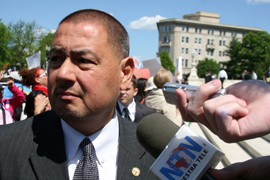Cronkite News has moved to a new home at cronkitenews.azpbs.org. Use this site to search archives from 2011 to May 2015. You can search the new site for current stories.
Who won? Who’s talking? Both sides claim victory in SB 1070 ruling
WASHINGTON – Arizona Gov. Jan Brewer and the Mexican American Legal Defense and Education Fund are on opposite sides of the state’s SB 1070 immigration law, but both claimed victory in Monday’s Supreme Court decision on the law.
In the flurry of statements following the high court’s much-anticipated ruling, no one admitted defeat. All claimed victory of some kind and most saw the decision as a step in the right direction.
But with no referees to say for certain who won, victory is open to interpretation.
The uncontested facts are these: The high court voted 5-3 to reject three parts of the Arizona law as being in conflict with federal law, but to uphold a fourth part that gives local police the authority to check the immigration status of some suspects.
But the interpretation of those straightforward facts is where it gets subjective. That’s not surprising in a political town where who’s winning depends on who’s talking.
“Today’s decision by the U.S. Supreme Court is a victory for the rule of law,” Brewer said in her prepared statement.
On the other hand, a press release from MALDEF claimed a “resounding victory,” saying that the court’s decision “shreds the foundation of Arizona’s anti-immigrant law SB 1070.”
But the court refused to block what many consider the law’s most-controversial provision, requiring local police to check the legal status of any individual they stop if the officer has a “reasonable suspicion” that the person is here illegally.
U.S. District Judge Susan Bolton blocked enforcement of that part of the law, along with the three others weighed by the Supreme Court, shortly after SB 1070 was signed into law in 2010.
“After more than two years of legal challenges, the heart of SB 1070 can now be implemented in accordance with the U.S. Constitution,” Brewer said.
The heart that Brewer is referring to is Section 2(b), sometimes referred to as the “show me your papers” clause. And the heart of SB 1070 naturally beats differently depending on your perspective.
For Arizona State Sen. Steve Gallardo, D-Phoenix, Section 2(b) survived this round, but its future is tenuous at best.
“It’s a big victory for those that have continually said that Jan Brewer and the legislature is wrong,” Gallardo said.
“Of the four issues that were in front of the Supreme Court, three of those were shot down … and the last one is left there very weak,” Gallardo said.
One thing all sides agree on, even the Supreme Court, is that things are not over for SB 1070.
The Court made clear that its ruling Monday does not prevent other constitutional challenges to the “papers, please” provision after the law goes into effect, depending on how the law is implemented.
Brewer is confident it will be implemented correctly.
“We must use this new tool wisely, and fight for our safety with the honor Arizona deserves,” Brewer said.
Gallardo – again – sees things differently.
“This is going right back in front of the Supreme Court,” he said Monday.
- CNS reporter Jerilyn Forsythe contributed to this report.








